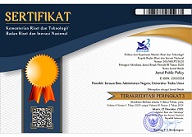Digital Poverty and Connectivity Disparities in South Sumatra: Mapping and Policy Implications
Abstract
Digital poverty, defined as the inability to access and utilize information and communication technology (ICT), remains a critical issue in South Sumatra Province. This study aims to map digital poverty and connectivity disparities across districts and cities, analyze their distribution, and assess their relationship with macro poverty. Using Barrantes’ (2007) framework, this research employs descriptive statistical analysis based on the National Socio-Economic Survey (Susenas) data from March 2023. The study utilizes the digital poverty index and macro index to classify regions into quadrants. The findings reveal that the highest levels of digital poverty are observed in Empat Lawang Regency (52.75%), North Musi Rawas Regency (44.625%), and PALI Regency (44.51%). Conversely, Prabumulih City (80.27%), Palembang City (80.17%), and Ogan Komering Ulu (74.43%) exhibit the highest levels of digital connectivity. These disparities highlight the urgent need for targeted policy interventions. Recommended strategies include digital literacy enhancement, improved internet access, and strengthened digital infrastructure, particularly in high-poverty regions. Effective implementation of these initiatives is crucial to reducing digital poverty and supporting sustainable economic development in South Sumatra Province.
Keywords
Full Text:
PDFReferences
Andita, V., & Rafaela, D. (2024). (2024). Akselerasi Transformasi Digital Untuk Pendidikan Berkualitas. Journal of Information Systems and Management (JISMA), 3(2), 90-93.
Barrantes, R. (2007). Analysis of ICT Demand: What Is and How to Measure Digital Poverty? Digital Poverty, 29–53. https://doi.org/10.3362/9781780441115.002
Buchaev, A. G., Buchaev, Y. G., Abdulmanapov, S. G., Abdullaeva, Z. M., & Mudunov, A. S. (2023). The Model of Sustainable Development of Economy Based on Digital Competitiveness Management. Advances in Science, Technology and Innovation, Part F1, 317–323. https://doi.org/10.1007/978-3-031-29364-1_63
Cetindamar, D., & Burdon, S. (2025). Digital competitiveness and policy making: lessons from Indonesia, Malaysia, and the Republic of South Korea.
Dudhat, A., & Agarwal, V. (2023). IAIC Transactions on Sustainable Digital Innovation (ITSDI) Indonesia’s Digital Economy’s Development. Transactions on Sustainable Digital Innovation (ITSDI), 4(2), 109–118.
Jurries, E. R. (2017). Challenges and Opportunities of the digital “revolution” in Indonesia. In E. Digital Indonesia: Connectivity and Divergence. Singapore: ISEAS Publishing.
Kane, G. (2019). The Technology Fallacy: People Are the Real Key to Digital Transformation. Research Technology Management, 62(6), 44–49. https://doi.org/10.1080/08956308.2019.1661079
Livia K, K. (2024). Improved ranking proof of successful digital transformation: minister. AntaraNews.Com. https://en.antaranews.com/news/304041/improved-ranking-proof-of-successful-digital-transformation-minister
Mergel, I., Edelmann, N., & Haug, N. (2019). Defining digital transformation: Results from expert interviews. Government Information Quarterly, 36(4). https://doi.org/10.1016/j.giq.2019.06.002
Pane, T. (2024). Indonesia’s Clove Exports in the Global Market: Trends, Forecasts, and Competitiveness.
Putri, E. R. (2024). Indonesia’s Clove Export Competitiveness in the Continental Markets of Asia and the World. https://doi.org/https://doi.org/10.15294/s27jvx39
Riadi, S., & . A. (2024). Examining the Indonesia Bureaucracy Response and Problem in Pandemic Times: A Preliminary Diagnostic Study. KnE Social Sciences. https://doi.org/10.18502/kss.v9i7.15501
Richmond, K., & Triplett, R. E. (2018). ICT and income inequality: a cross-national perspective. International Review of Applied Economics, 32(2),. 195–214.
Sari Wiedoko, J. (2023). Friend or Foe: Internet to Indigenous People in Indonesia (Lesson Learned from Inner Baduy Request for Internet Blackout). The Journal of Indonesia Sustainable Development Planning, 4(3), 328–334. https://doi.org/10.46456/jisdep.v4i3.506
Seah, K. M. (2020). COVID-19: Exposing digital poverty in a pandemic. International Journal of Surgery, 79, 127–128. https://doi.org/10.1016/j.ijsu.2020.05.057
Sinaga, W. M. B. B., & Firmansyah, A. (2024). Perubahan Paradigma Pendidikan di Era Digital. Jurnal Teknologi Pendidikan, 1(4), 10. https://doi.org/10.47134/jtp.v1i4.492
Situmorang, A. C., Suryanegara, M., Gunawan, D., & Juwono, F. H. (2023). Proposal of the Indonesian Framework for Telecommunications Infrastructure Based on Network and Socioeconomic Indicators. Informatics, 10(2). https://doi.org/10.3390/informatics10020044
Veselica, R. (2019). the Impact of Digital Innovation on National Competitiveness. Economic and Social Development (Esd 2019), March, 441–448.
Vial, G. (2021). Understanding digital transformation: A review and a research agenda. Managing Digital Transformation: Understanding the Strategic Process, 13–66.
Wahyunengseh, R. D., & Hastjarjo, S. (2023). Digital Competitiveness and Poverty Index Quadrant: Mapping the Digital Public Administration Challenge (Evidence from Indonesia). BISNIS & BIROKRASI: Jurnal Ilmu Administrasi Dan Organisasi, 30(2). https://doi.org/10.20476/jbb.v30i2.1379
Widyastuti, A. T., Hartono, D., Sidig, D. S., & Rusmawati, E. (2023). Financial inclusion’s impact on energy poverty: Evidence from Indonesia. World Development Sustainability, 3. https://doi.org/10.1016/j.wds.2023.100113
DOI: https://doi.org/10.35308/jpp.v10i4.8961
Refbacks
- There are currently no refbacks.
Copyright (c) 2025 Rika Yurista, M. Nur Budiyanto, Muhammad Abduh
p-ISSN: 2477-5738 I e-ISSN: 2502-0528 I DOI: 10.35308
Jl. Alue Peunyareng, Ujong Tanoh Darat, Meureubo, Kabupaten Aceh Barat, Aceh 23681, Indonesia
(0655) 7110535 l +621260313742 l +6285277110911
 is licensed under a Creative Commons Attribution-ShareAlike 4.0 International License
is licensed under a Creative Commons Attribution-ShareAlike 4.0 International License


